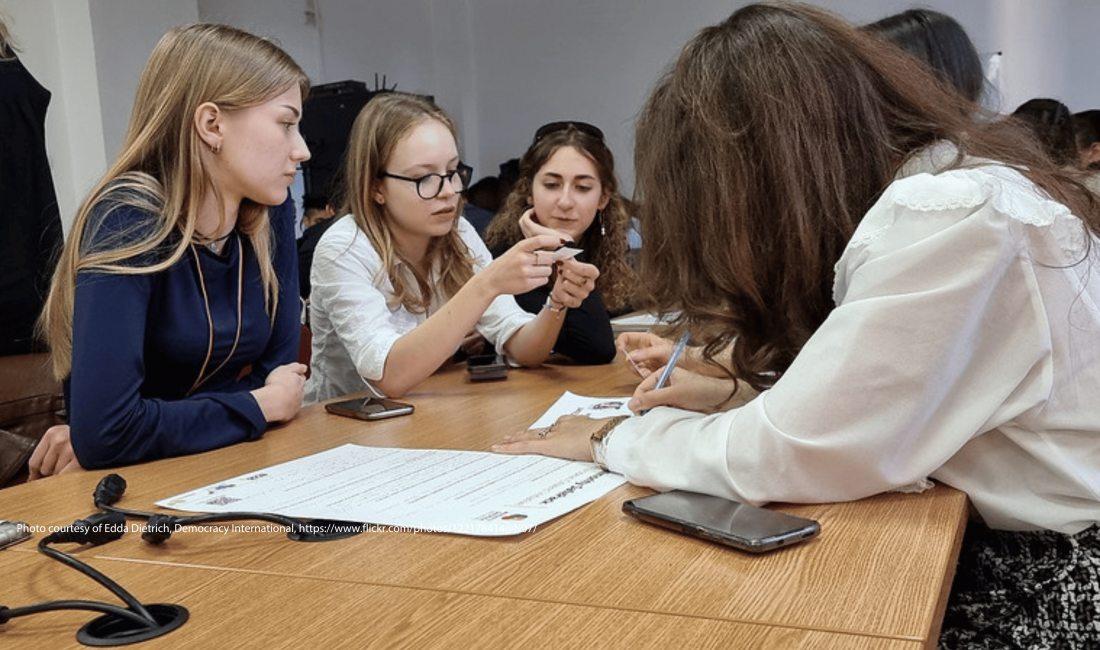1,000,000 signatures. 365 days. 7 member states. These are the heavy hurdles that organisers of European citizens’ initiatives are facing. The thresholds are only further intensified when we consider that there is a lack of awareness of the instrument’s existence, so many citizens don’t even know what they are being asked to sign.
Inversely, we can be sure that there is no shortage of ideas for things that can improve in the EU. As we approach the end of the year, our collection of several co-creation workshops on the European Citizens’ Initiative (ECI) marks a great opportunity to reflect on the many ideas out there – and who knows, they might just be an ECI you can sign in the future.
The first of three ECI simulation events kicked off on 19 April at the youth-focused Level Up held at the European Parliament in Brussels. The workshop was a huge hit and provided an entry-level, immersive, and gamified introduction to the ECI. But first things first: as most of the participants hadn’t heard about the ECI before the workshop, we started with an introduction to the ECI and reviewed the steps necessary for a successful initiative. After, the bulk of the time focussed on a mini-ECI Simulation – from coming up with ideas and proposals for an ECI in small groups to convincingly pitching the ECI to fellow participants.
Nearly identical workshops, called ECI Bootcamp, took place on 16 May in Bucharest as part of our Global Forum on Modern Direct Democracy, as well as on 4 September during a youth event in cooperation with the City of Cologne. All three events were targeted at young activists, future changemakers, and Europe’s upcoming advocates.
We took a closer look and comparison of the results of our various ECI simulations, where we found that some parallels can be drawn between the proposals that resulted from the workshops and the real ECIs registered and launched since the tool’s birth in 2012.
What exactly are the topics at the forefront of participants’ minds? Unsurprisingly, the trends reflect current broader social movements, particularly affecting younger generations. All three workshops had groups organically creating mini-ECIs on topics of animal and climate protection, digital transformation, and fundamental rights. For keen followers of the ECI, these topics and trends might sound very familiar. In fact, eight out of the ten total successful ECIs have dealt with the topics of animal and climate protection, clearly representing an agreement on the need for stronger protections within these areas. Most prominently, the ECI End The Cage Age surpassed the required one million signature threshold in late 2019 and received an answer from the European Commission in 2021. To the dismay of organisers and supporters, the European Commission has not laid out a clear timeline to meet its response to the initiative and has only indefinitely delayed its timeline.
Still, a reform of animal farming practices in the EU remains popular. During the ECI simulations in Brussels, participants created, among others, the ECI Green Farm for the promotion of ecological farming practices within the EU. A very similar initiative resulted from the Cologne session, producing the ECI Happy Land, Happy Plant. Interestingly, at the start of the year, a group of organisers registered the European Citizens' Initiative in Defence of Agriculture and Rural Economy in Europe, clearly showcasing the interest in this topic.
Issues occurring in digital space were equally present in various forms during the workshop’s interactive sessions. Switch the representation from physical to DIGITAL is a mini-ECI created during our Brussels session, which was seeking the promotion of digital voting systems for the European Parliament elections in all Member States. A different angle was taken in Cologne by Stop Online Hate, where young participants proposed to challenge online bullying by ensuring that every internet interaction can be traced back to a real individual. The digital space has also amassed wider support throughout the EU, evidenced by the support for the ECI Stop Destroying Videogames. This initiative calls for stronger consumer protection enforcement for videogame publishers. This ECI has been one of the fastest-growing ECIs in history, keenly utilising online personalities to promote the ECI. While this not only supports the initiative, it could potentially also introduce younger audiences to the ECI instrument in general.
The third topic of fundamental rights ranges from Help Refugees created by participants in Bucharest, supporting refugees by ensuring their safety and dignity, to Save our homes, pitched by a group in Brussels and dealing with the housing crisis and gentrification. Fundamental rights have a long history of ECIs registered with the European Commission trying to – sometimes contrastingly- reshape and extend their protection within the EU. A comparison of two ECIs makes this clearer. While the second-ever successful ECI, One of Us, aimed to stop EU-funded research on the destruction of embryos, the ECI My Voice, My Choice: For Safe and Accessible Abortions, currently also one of the fastest-ever growing ECI in history, promotes financial support to Member States that would be able to perform safe termination of pregnancies for anyone in Europe still lacking access to safe and legal abortions. Fundamental rights remain a divisive and polarising topic in the EU at large and within a small-scale workshop.
The year 2024 has been eventful for the ECIs, with great lows and highs. While End the Cage Age, as the most popular ECI in history, is still waiting to receive actionable plans from the European Commission, Stop Destroying Videogames and My Voice, My Choice have received supporting signatures in record time, and we can expect to see them surpass the one million signature threshold next year. Our workshops this year have shown that the topics at the core of the EU’s citizens have common themes and show real possibilities of change if awareness of the ECI exists.




